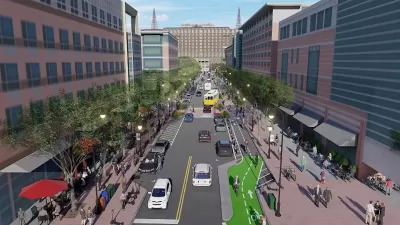With a burgeoning bike culture that saw the fastest rise in bike commuting in America from 2000-2009, Atlanta Mayor Kasim Reed has recognized the potential in this grassroots growth by announcing the goal of being a top-ten cycling city by 2016.
Notoriously sprawling Atlanta is the new entrant in the race to become one of America's bike-friendliest cities. Kate Sweeney looks at the ways city leaders are seeking to build on Atlanta's bottom-up bike culture in order to become one of the bike-friendliest cities in the country.
"Earlier this year, Mayor Kasim Reed’s office promised cycling improvements on a scale Atlanta’s never seen, investing more than $2 million in biking infrastructure. By 2016, Atlanta pledges to double its miles of bike lanes. This includes adding lanes that will connect the Atlanta University Center to downtown and connect the Beltline with Centennial Olympic Park, among other plans."
"Really, the move for more bike lanes, trails, and the city’s next highlighted project—a bike-share program—isn’t coming mainly from the city at all," says Sweeney. "It’s coming from the cyclists who want it. And if it’s to continue, it’s up to the folks on two wheels to continue to push."
FULL STORY: Can Atlanta Become a Top 10 Cycling City?

Alabama: Trump Terminates Settlements for Black Communities Harmed By Raw Sewage
Trump deemed the landmark civil rights agreement “illegal DEI and environmental justice policy.”

Planetizen Federal Action Tracker
A weekly monitor of how Trump’s orders and actions are impacting planners and planning in America.

The 120 Year Old Tiny Home Villages That Sheltered San Francisco’s Earthquake Refugees
More than a century ago, San Francisco mobilized to house thousands of residents displaced by the 1906 earthquake. Could their strategy offer a model for the present?

Ken Jennings Launches Transit Web Series
The Jeopardy champ wants you to ride public transit.

BLM To Rescind Public Lands Rule
The change will downgrade conservation, once again putting federal land at risk for mining and other extractive uses.

Indy Neighborhood Group Builds Temporary Multi-Use Path
Community members, aided in part by funding from the city, repurposed a vehicle lane to create a protected bike and pedestrian path for the summer season.
Urban Design for Planners 1: Software Tools
This six-course series explores essential urban design concepts using open source software and equips planners with the tools they need to participate fully in the urban design process.
Planning for Universal Design
Learn the tools for implementing Universal Design in planning regulations.
Clanton & Associates, Inc.
Jessamine County Fiscal Court
Institute for Housing and Urban Development Studies (IHS)
City of Grandview
Harvard GSD Executive Education
Toledo-Lucas County Plan Commissions
Salt Lake City
NYU Wagner Graduate School of Public Service





























